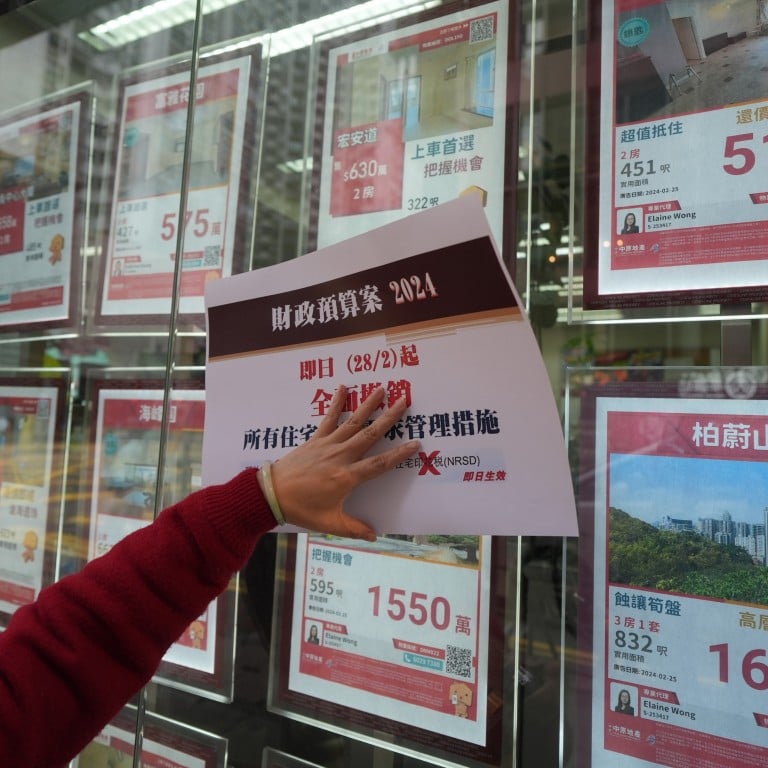
Mainland Chinese buyers thronging to Hong Kong property sales in search of returns after removal of curbs, industry insiders say
- Mainland buyers see Hong Kong properties as offering better capital appreciation prospects and diversification compared to mainland China, Habitat Property’s Victoria Allan says
- Surge in transactions in the short term is exciting, but ‘I would stay cautious about a sustainable recovery’, CGS International Securities’ Raymond Cheng says
There has been a sudden rebound in the volume of home sales in general, with a total of more than 580 property transactions in the primary market between Sunday and the announcement of curb relaxations last Wednesday, according to agents.
“We observed shortly after the budget more than 500 online enquiries from mainland buyers, who showed an interest in Hong Kong property,” said Andy Lee, the China CEO of Centaline Property Agency. A couple of enquiries were also made about new investment opportunities, he added.
“[Mainland buyers] view Hong Kong properties as a favourable investment choice, offering better capital appreciation prospects and diversification compared to mainland China,” said Victoria Allan, the founder of Habitat Property.
For instance, shortly after the new policy was announced, a mainland buyer swiftly bought a 502 sq ft three-bedroom unit in Sheung Shui for HK$4.85 million (US$619,857), according to property agent Ricacorp Properties. The buyer had previously hesitated but made a quick decision following the removal of the property cooling curbs.
And while the number of registered transactions had fallen 28 per cent in February to 3,189 deals when compared with January, Ricacorp said it expected the number to surge by 80 per cent to 5,750 deals this month.
“We’ve observed more inquiries from mainlanders via the top talent scheme, [who are] buying for self use, and also people living in Shenzhen buying properties for investment,” said Eddie Kwok, senior director of valuation and advisory services at CBRE Hong Kong. “They are more interested in new projects within HK$10 million.”
Watchmaker Omega confident in Hong Kong shoppers as it opens two glitzy shops
Belgravia Place is the first major residential project in Hong Kong to test the market after the government removed all curbs for buyers in its budget.
Henderson will offer another 208 units for sale, which will be priced between HK$3.59 million and HK$8.68 million. After discounts, the cheapest unit measuring 199 sq ft will be priced at HK$3.23 million, or HK$16,076 per square foot, 8 per cent higher than the floor price of HK$14,838 per square foot seen in the first round launch on Sunday.
“For [mainland] investors, buying properties in mainland China will have limitations, and policies are always changing,” CBRE’s Kwok said. “Hong Kong’s property market is relatively more stable. Since the government scrapped all property curbs, this may further stimulate demand.”
‘Worst is over’ for Hong Kong property even though sales dropped in February: analysts
Rental yields have risen from a low last year, Kwok added. Even though rents dropped slightly in January after rising for the previous 12 months. This is expected to attract investments as well.
Louis Chan, CEO of the residential division at Centaline, said he expected that 50 per cent of home purchases will come from mainland buyers and forecast that home prices will go up by 5 per cent this year.
Other market observers, however, said the impact of capital inflows from the mainland might not be substantial, with an economic slowdown in China and Hong Kong developers’ destocking efforts hindering significant home price increases.
NWD to tap improved sentiment by bringing property launches forward
“It is exciting to see a surge in transaction volumes in the short term, but I would stay cautious about a sustainable recovery,” said Raymond Cheng, managing director at CGS International Securities in Hong Kong. “Developers still need time for destocking, and will not raise prices soon.”
Cheng forecast a low single-digit decline in home prices for the first half of 2024, because of the discounts offered by developers, followed by an increase of 3 per cent to 5 per cent in the second half.
“We are not shocked [about the response to Henderson’s Belgravia Place project],” said Zerlina Zeng, senior analyst at CreditSights, adding that it is also a result of discounts.
“It is unclear whether the strong sentiment will be sustained. We also saw first-tier cities in [mainland] China staging strong transaction volumes post local easing measures, which tapered off after a couple of months.”
She forecast another 5 per cent drop for home prices in the city this year, as developers are likely to continue slashing prices to accelerate cash generation for debt servicing, which is expensive now due to the high interest rate environment.



